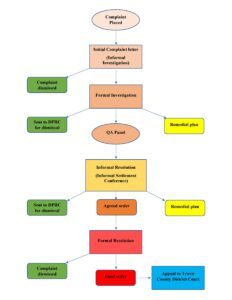Content Highlights
How a physician defends a Texas Medical Board Review will determine the fate of his or her practice, career and livelihood. Read on to learn how to defend yourself and your medical license before the Texas Medical Board Review.
You must engage an expert attorney when defending against a Texas Medical Board Review. At Gardner Employment Law, we have represented many physicians over the years, and we know what it takes to get the job done right.
How Does a Physician Defend Against a Complaint Filed with the TMB?
The TMB review process is complicated with many steps and possible outcomes. Pitfalls abound. We created a flowchart outlining the stages of the TMB (Texas Medical Board) review process:

Any Texas physician who receives an initial complaint letter from the TMB should seek experienced legal counsel immediately. An initial complaint letter is never routine and it is never something to be taken lightly. If you have received an initial complaint letter it means that a complaint has been filed against you and an informal investigation has already begun. Your ability to practice medicine in Texas and in other states is in jeopardy.
A proper defense begins the second you receive the initial complaint letter because the TMB will likely require a response from you in thirty days or less. Read in “Texas Medical Review Board Lawyer” where we explain how a well-crafted response letter can stop most complaints dead in their tracks. A failure to respond to this initial TMB letter can result in disciplinary action against you, including revoking your medical license. Time is of the essence. Writing your own response may be hazardous because anything you say in your response letter can be used against you at any stage if the TMB decides to investigate further.
What is the TMB Review Process After the Initial Complaint Letter?
A physician must file a written response with the TMB with facts and reasoning to explain why the complaint must be dismissed. With good writing skills, your attorney may be able to have the complaint dismissed just with your first response. We have been successful in sending a response and getting the results our client wants. You need to be aware of just how broad the TMB’s authority is.
Under the Texas Medical Practice Act, the TMB has the authority to investigate issues such as billing errors, standard of care, physician infractions not related to their medical practice (think criminal or civil charges), and a wide array of other conduct. Physicians have reported to us that some patients file complaints for not receiving their billing statements soon enough. Do not worry if you don’t exactly know why you received an initial complaint letter, because the situation may not be entirely clear at first. Instead, focus on how to defend yourself.
After you have responded to the initial complaint letter, the investigation will either be dismissed or proceed to a formal investigation. At this stage, the TMB will gather evidence against you regarding the complaint. This evidence can include documents related to the complaint, interviews with patients or staff, and anything else the TMB may believe is required to determine the next step. If the complaint was regarding medical care, the TMB will have an expert panel of two physicians practicing in the same or similar field as you. The expert panel will review the evidence and will recommend either (1) dismissing the complaint by sending it to the DPRC (Disciplinary Process Review Committee) for final approval or (2) further evaluation.
If further evaluation is recommended, next the QA (Quality Assurance) panel will then look at the totality of the evidence gathered before making a recommendation. The QA panel can either refer the complaint to
- the DPRC for dismissal,
- the litigation department for an ISC (Informal Settlement Conference), or
- offer you a remedial plan.
A remedial plan is like a settlement offer and gives the physician certain options to avoid a formal disciplinary action. While following a remedial plan is less damaging than a formal disciplinary action, it will still appear on your public physician profile and can be read by patients and others who search the records.
What are the Informal Resolution and Formal Resolution Stages?
The informal resolution and formal resolution stages are where the you can discuss the complaint and present your position. The TMB resolves the majority of complaints filed at the ISC. If you have not sought expert legal counsel yet, this will be one of your last chances to do so before it is too far gone. The further you wait in the review process, the more difficult it is to defend. Although the term “informal” is used, the TMB staff attorney can and does assert control over much of the hearing process.
Informal Settlement Conference. If the QA panel recommends an ISC, the panel sends the complaint to the litigation department. A TMB staff attorney will be assigned to the case. The staff attorney will schedule an ISC where a panel of two board representatives will be created, consisting of one physician member and one member from the general public. The two representatives, the TMB counsel, and the physician will review the information, with the physician offering his or her explanation against the claims brought. A physician has the right to have an attorney present at the ISC and should exercise that right. After conducting the ISC and deliberating, the board representatives can ultimately take one of seven actions:
- Recommend the complaint or allegations be dismissed;
- Recommend an agreed order and propose resolution of the case in writing;
- Defer the ISC pending further investigation;
- Direct the filing of a formal complaint with SOAH;
- Recommend the convening of a disciplinary panel to consider the temporary suspension or revocation of the physician’s license;
- Recommend imposing an administrative penalty; or
- Recommend a remedial plan to resolve the complaint.
While 90% of the disciplinary actions the TMB takes are resolved through the ISC, if the agreed order is recommended and the physician declines, the formal resolution stage begins.
Formal Resolution by Administrative Hearing. This stage is somewhat similar to a trial, except that one ALJ (Administrative Law Judge) presides with no jury. The ALJ hears witnesses and considers documents that are offered as exhibits. To proceed to the ALJ hearing, the TMB staff attorney will file the complaint with the SOAH (State Office of Administrative Hearings). Under Texas law, the SOAH handles all formal cases from a variety of boards and administrative bodies. Since the TMB is responsible for the administration of the practice of medicine in Texas, the SOAH handles the ALJ hearings, not a traditional court of law.
The ALJ, who is a part of the SOAH, will conduct the hearing similar to a normal court case. After the hearing, the ALJ will require each side to submit briefs summarizing the evidence that was presented at the hearing. This is another opportunity for an attorney with excellent writing skills to persuade the ALJ in the physician’s favor. We have won many ALJ hearings based on our superior brief-writing skills. After reviewing the parties’ briefs, the ALJ will write and present a “proposal for decision” to the TMB.
Once the TMB has the proposal for decision, the Board may issue a final order with disciplinary actions or dismiss the case. The TMB’s final order is binding on the physician and the end of the road in this review process. No other TMB process exists to change the order.
The only other remedy is an appeal to a Travis County District Court. Since this was a proceeding in the executive branch of government (the TMB is an “agency” under the Texas Governor), the District Court must accept the TMB’s ruling as correct unless the District Court concludes that the ruling was “arbitrary and capricious,” meaning the TMB’s final order has no reasonable grounds in either the facts or the law. That result, setting aside the TMB final order, is very rare.
Why You Need an Attorney to Defend a TMB Review
While a physician may be an expert in his or her own field, physicians usually are not experts when facing a TMB review. The review is difficult for physicians to navigate. At every step of the process there are pitfalls by which physicians can unknowingly harm their own case. This definitely fits with the saying that you are in trouble when “you don’t know what you don’t know.” Crafting a solid defense plan as early as possible with an expert attorney is the best way that a physician can assure that his or her license, career and livelihood are protected. Gardner Employment Law can do that.
If you are wondering how to respond to a TMB complaint letter, how to navigate the stages of the TMB review process, or simply want to know more about this topic, we would be happy to help you.

